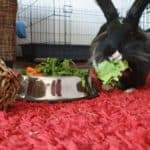You may have noticed that your bunny makes sounds with their teeth. This is one of the ways your bunny will communicate with you. Paying attention to how loud their teeth grinding or chattering is can give you an insight into how they are feeling.
Teeth grinding can be a sign of pleasure or pain. Bunnies will grind their teeth gently as a sign of happiness and content. However, they will loudly grind their teeth if they are in pain or discomfort.
Gentle teeth grinding often occurs when your bunny is being petted. Louder tooth grinding is often less continuous than gentle teeth grinding and accompanied by other body languages that indicate discomfort. Knowing these signs will allow you to understand your bunny’s signals.
My Bunny Grinds Her Teeth When I Pet Her
When you pet your bunny, you’ll often hear her teeth chatter. This is actually your bunny purring! Just like a cat will purr when they are happy and content, bunnies do the same thing but with their teeth.
Related: How Do You Know If Your Bunny Loves You?
How do you know that they are purring and not grinding their teeth because they are in pain?
One way to tell is to stop petting your bunny and see if the teeth grinding stops. Then, start petting your bunny again and the soft teeth grinding should start again. If she is fully relaxed and splayed out next to you while gently grinding her teeth, then she is very comfortable and content.
If you really get a spot that your bunny loves, expect the purring to get more intense! Eventually, they may even fall asleep if they are enjoying their time with you.
Be aware of the signs that they may have had enough of being petted. Some bunnies may become over stimulated and seek to get away. Some of these signs can be:
- Eyes wide open – when your bunny is on alert, you’ll see their eyes widen. Your bunny is looking around the room to see where they can escape to.
- Low growls – if your bunny goes from soft teeth grinding to low growls, it may be time to let your bunny be alone. She may be starting to get restless and frustrated.
- Digging – when your bunny starts to dig on you, it may be them telling you to stop petting them. However, not all bunnies will dig because of this reason, some may just be curious.
- Squirming – if your bunny starts to squirm a lot on your lap, she is likely becoming agitated and wants to be left alone.
- Loud teeth grinding – if soft tooth grinding starts to become loud, she may be in discomfort from all the attention.
- Biting or nipping – your bunny has likely had enough and is fed up.
My Bunny Is Grinding Her Teeth, Is She In Pain?
If your bunny is grinding her teeth while alone, this could be a sign of pain and discomfort. If you aren’t sure if your bunny is in pain, offer her favourite hard treat.
If she refuses to eat it, it could be because of dental pain.
If your bunny is suffering from teeth pain, here are some symptoms to look out for:
- Drooling or wetness around the mouth.
- Swelling and pain around the jaw and under the chin.
- Avoiding hard foods.
- Bad breath.
If your bunny is not showing any of these symptoms, the loud teeth grinding could be a signal for pain elsewhere. There are other warning signals that may accompany loud teeth grinding such as:
- Hunched posture – a bunny in pain may crouch over and curl up in a ball which may indicate a digestive issue.
- Refusing to eat or drink – if their teeth are causing them pain, they will be reluctant to eat or drink, especially hard and dry foods.
- Not sleeping – pain could likely be keeping your bunny awake.
- Less movement – normal bunny behaviour involves plenty of excitement and exercise. If she is not exercising, something is causing her distress.
- Being grumpy – being less social and biting when you engage her are likely signs of discomfort.
If your bunny has any of these symptoms, make sure to contact the vet immediately. Especially if it is paired with loud teeth grinding. While these are signs of pain and discomfort, teeth grinding may not indicate physical pain but mental.
As bunnies are prey animals, they are easily stressed and can be anxious beings. Stress can potentially cause loud teeth grinding and could be triggered by:
- Loud noises.
- Loneliness.
- New environments.
- Presence of predators.
- Extreme boredom.
- Bad living conditions.
- Excessive handling from humans such as chasing.
- Grief.
A very stressed bunny can put them at a greater risk for sickness and disease. It’s important to recognise what the cause of your bunny’s stress may be and eliminate the source.
My Bunny Is Grinding Her Teeth While Sleeping

You may notice that your bunny grinds her teeth while she sleeps. If your bunny has flopped on their side or is splayed out while dozing off and her teeth are grinding, then she is most likely happy and content as she is purring.
Teeth grinding while sleeping could also be a sign that she is dreaming. Don’t disturb your bunny during this state of sleep as it is the deepest state of sleep called rapid eye movement. Let your bunny awake in her own time and you can pet her and give her all the attention she deserves.
How Do I Check My Bunnies Teeth?
This job is much better for the vet to perform. However, you can check your bunny’s teeth at home to see if they are causing problems if she is grinding them loudly. Here are some tips to see if your bunny potentially has a dental problem.
- Feel gently along the sides of your bunny’s face and under their jaw while they sit on the floor facing away from you. The sides should feel equal with no bulges or swelling.
- Apply a little more pressure to the sides of the face. If they flinch, there may be something in the mouth causing pain. Seek your vet immediately. Remember under your bunny’s chin are their scent glands which are slightly bumpy so don’t be alarmed if you feel those.
- Gently part your bunny’s lips back into a smile and check their four large front teeth (two top and two bottom) are not loose and that their gums are healthy and pink. Red or purple gums could indicate dental disease.
- If their teeth don’t meet, they may suffer from a condition called malocclusion which often means their teeth don’t wear properly and become overgrown very quickly. Take your bunny to the vet to have their teeth trimmed.
- The cheek teeth are too far back in the mouth to be easily checked by yourself. Vets will generally sedate the bunny to do a complete dental check which should be done every year.
How Do I Keep My Bunnies Teeth Healthy?
Dental problems can be caused by a multitude of factors. These being:
- Inadequate wearing of the teeth – bunny teeth grow approximately 2mm every week. If the teeth aren’t constantly worn down through chewing, then this can cause teeth problems.
- Nutritional deficiency – bunnies teeth need a constant supply of calcium in order to grow. Further, to keep your bunnies teeth healthy, they will need plenty of vitamin D, vitamin A, magnesium, and protein.
- Genetics – some breeds are just more susceptible to dental problems than others. Netherland Dwarfs and lop-eared bunnies have flatter faces which put them at greater risk.
Ensuring growing bunnies have sufficient calcium and vitamin D is one way to help prevent dental diseases. Calcium deficiency can contribute to poor tooth and bone quality and dental disease.
A level of 0.6-1.0% or 5-10g/kg is recommended for pet bunnies. This is why it is so important to provide the correct hay for your growing bunny. Different species of hay have varying levels of calcium. Check out our nutritional table in our “What Can Bunnies Eat” article.
Dandelion and clover flowers are rich in calcium which is perfect for growing bunnies.
Vitamin D helps maintain calcium levels within a normal range. This is important as excessive calcium can also lead to health problems such as thickening of the urine. Just like humans, bunnies synthesise Vitamin D from the sun.
Research by Science Daily states that bunnies who remain indoors may suffer from a lack of Vitamin D and this deficiency can lead to dental problems.
Giving the bunnies regular ultraviolet B light exposure (e.g. sunlight but not through windows as windows block these UVB rays) for two weeks doubled the bunnies Vitamin D levels. Now, in some circumstances, such as apartment living or winter, taking your bunny outside for sun may not be possible.
A recent 2019 study showed that a diet consisting of unlimited hay and plenty of commercial pellets led to significantly higher Vitamin D levels compared to not having as much access to these foods.
It’s important then to provide your bunny with adequate food and especially with pellets that are fortified with Vitamin D when your bunny can’t get enough sunlight.
You should feed at least three types of fruits and vegetables each day including one type of fibrous vegetable such as broccoli, cabbage, spinach, or cauliflower. This way, your bunny will get a mixture of vitamins and minerals from a variety of different foods.
Related: What Can Bunnies Eat And Not Eat?
Provide your bunny with unlimited hay and plenty of different chew toys. The constant chewing will keep your bunny’s teeth worn down.
Do I Need To Brush My Bunny’s Teeth?

Other common pets can have their teeth brushed, such as cats and dogs, just like humans can. However, you will never be advised to start brushing your bunny’s teeth.
This is because a bunny’s tooth grows throughout their whole life. Their teeth are constantly worn down and new teeth keep growing. Hence there is no need to brush when the teeth keep renewing!
What Can I Feed My Bunny If She Is Having Tooth Pain?
Since bunnies with tooth pain struggle to eat solid food, creating mashes of bunny safe foods can help them eat either voluntarily or by a syringe. It’s critical that a bunny constantly has food moving through their gut to avoid GI stasis, a condition that can cause severe gut pain. Here are a few mash recipes that you can make:
Carrot Crush (blend together)
- 1 peeled tomato
- 10cm piece of carrot
- 4cm piece of broccoli
- 4cm piece of cauliflower
- 2 sprigs of parsley
- 5 ml of water
Banana Mix (blend together)
- 8cm piece of banana
- 10 Tbsp of oat bran
- 15 ml of water
Critical Care
- ¼ banana
- 1/8 cup regular bunny pellets
- ¼ cup unflavoured Pedialyte
- 1/8 cup canned pumpkin
- Optional: bunny vitamins, oats, molasses
If the mixtures look dry, add a little more water and blend again. It’s important to only use foods your bunny has had before and is used to. Don’t introduce a bunch of new fruits and vegetables into a mash as it may cause more discomfort to your bunny. Substitute any fruits and vegetables with ones your bunny is familiar with.
Wrapping Up
Get your bunny’s teeth regularly checked by your vet to make sure their teeth stay healthy for life. Keep an eye out for symptoms of pain which will likely be communicated by loud teeth grinding.
Gentle teeth grinding is a sign that your bunny is happy and content with you and you should continue doing what you are doing to keep her happy!





